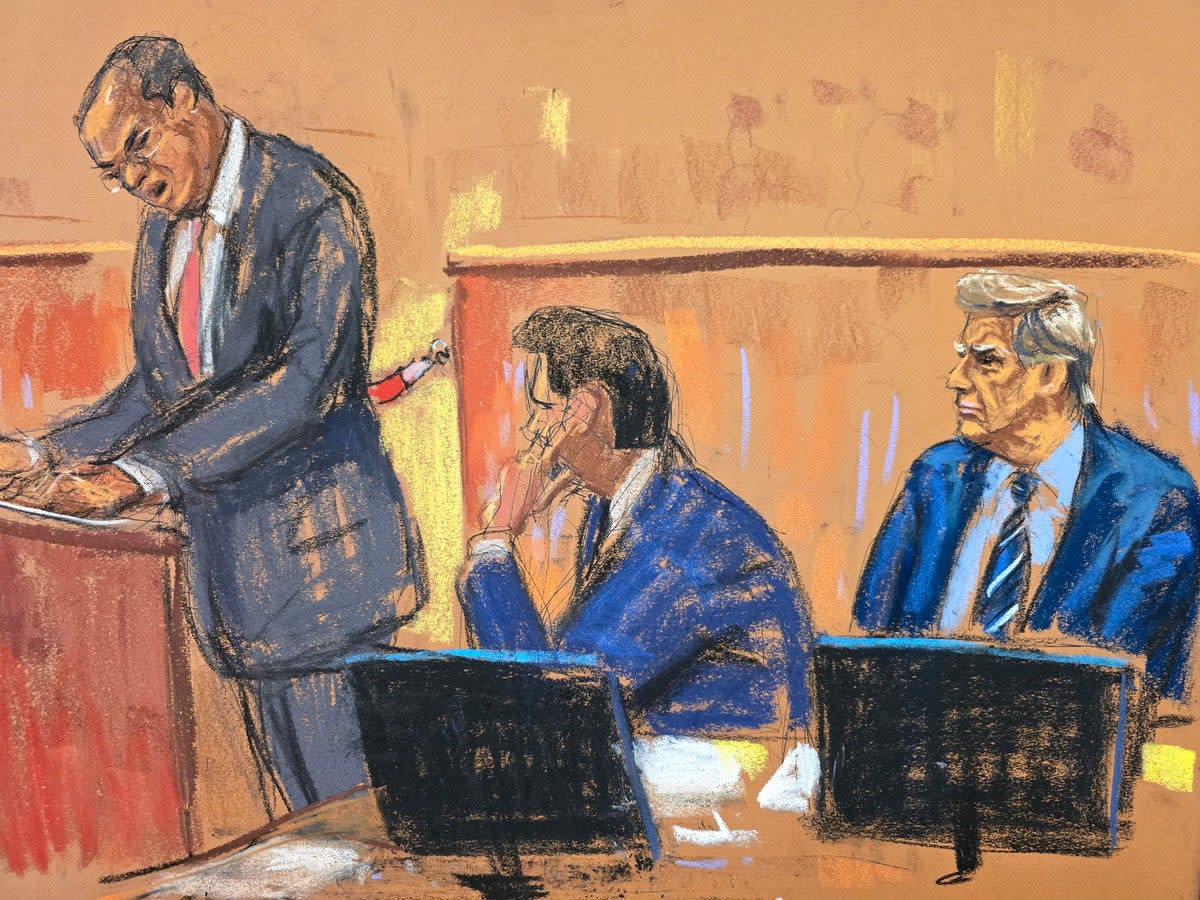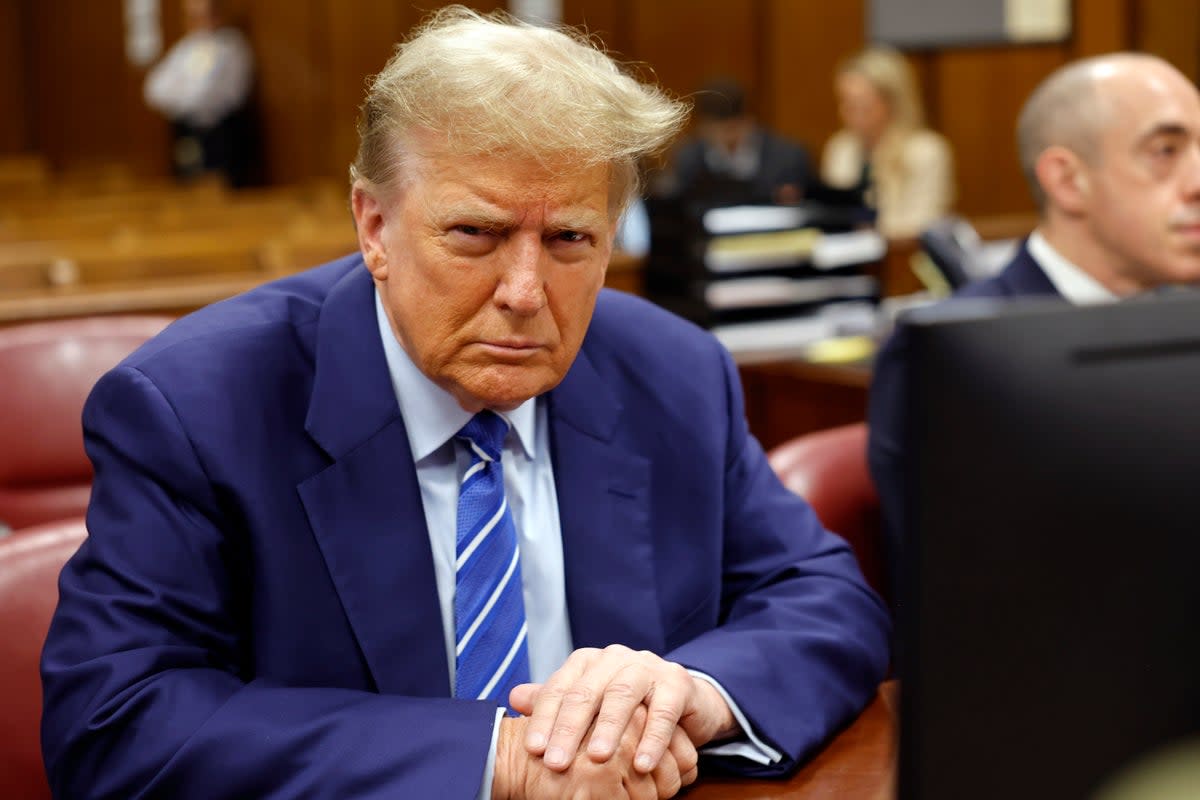Trump’s jury starts to take shape: Seven New Yorkers now seated in historic hush money trial
Seven Manhattan residents – including an Irish waiter, an oncology nurse and a man who finds Donald Trump “fascinating” – have now been selected to serve on a jury that could deliver the first criminal trial verdict against the former president.
Sitting with his attorneys in a criminal courtroom on Tuesday, Mr Trump craned his neck to get a good look at the group during the second day of jury selection in his landmark hush money case.
About 100 people were called into the jury pool on Monday. Roughly half of them were dismissed outright, stating that they could not be fair and impartial. A randomly selected group of potential jurors were asked to read through a 42-question survey before prosecutors and attorneys for the former president asked them questions individually.
By Tuesday afternoon, seven jurors had been sworn in to the trial – including the foreperson who will likely read out the former president’s verdict to the court, if one is reached.
With the process now fully in swing, New York Justice Juan Merchan suggested that a full panel could be selected by Monday, with opening arguments to follow in the first ever criminal trial of a current or former US president.
Throughout jury selection, the former president leaned back in his chair and read along with the survey questions on a piece of paper pulled close to his face. At other points, he leaned forward and stared at the jury box, or hunched all the way forward and hovered his face inches from the desk in front of him. He also closed his eyes.
During questioning, one juror said he finds the former president “fascinating”.
“He walks into a room and he sets people off. I find that really interesting,” he said. “Certainly he makes things interesting.”
Mr Trump flashed a smile. An overflow courtoom full of reporters couldn’t help but laugh.
His lead attorney Todd Blanche stood for a moment and then responded: “Um, all right. Thank you.”

At another point in the day’s proceedings, Mr Trump was scolded by the judge after he was heard “audibly” commenting about a juror and “gesticulating” towards her.
Mr Trump’s attorneys had asked to speak with one potential juror who appeared to post a video on social media showing New Yorkers celebrating – a video the former president’s legal team said appeared to be anti-Trump.
When she left the room, an incensed Judge Merchan lambasted the former president for his apparent “indimidation.”
“I won’t tolerate it. I will not have any jurors intimidated in this courtroom,” the judge said. “I want to make that crystal clear.”
Mr Trump is facing 34 felony charges of falsifying business records in connection to an alleged “hush money” scheme to bury compromising stories of his alleged affair with an adult film star. Prosecutors have argued that the case is one involving an election interference plot to deceive voters in the weeks before the 2016 presidential election.
Defence attorneys and prosecutors with the Manhattan District Attorney’s office got their first chance on Tuesday to “strike” potential members of the jury on Tuesday, whittling down a pool of 500 prospective jurors to the 18 Americans – 12 members and their alternates – who could be the first to ever find a former president guilty of a crime.
Assistant District Attorney Joshua Steinglass asked jurors whether they can put aside what they might already know about the former president, stick to the facts, and determine whether Mr Trump falsified business records “to cover up an agreement to unlawfully influence the 2016 election”.
Mr Trump’s attorney told jurors that the former president deserves a “fair shake”.
“It’s easy to read something off a sheet of paper and say, ‘Yes I’m going to be fair and impartial,’” Mr Blanche said. “What I want to do is test that a little bit.”
Mr Blanche asked for jurors’ opinions of Mr Trump before they walked into the courthouse, stressing that he wouldn’t be “offended” by whatever they said.
The former president has tried, and failed, to move the case out of Manhattan, baselessly arguing that a jury pool would be unfairly biased against him, and that he instead should be tried in the Republican-leaning borough of Staten Island, which he won in 2016 and 2020.
Instead, juror after juror questioned in the court affirmed that they could remain fair and impartial, weigh the facts of the case, and put whatever political or personal feelings about Mr Trump aside.
“I didn’t even know I was walking into this,” one prospective juror replied. “I’m here for my civic duty. I’m here just to listen to the facts and not let anything persuade me either way.”

Another potential juror – who one day earlier declared that “nobody is above the law, whether it’s a former president, a sitting president, or a janitor” – said that his opinion of Mr Trump “has no bearing”.
“What I think about President Trump outside of this room has nothing to do with what’s going on inside this room and would not, in my mind,” he said.
Mr Blanche tried to press him to answer.
“My view doesn’t matter. If we were sitting in a bar, I would tell you. But in this room, what I feel about President Trump is not important,” he added. “I’ll say I’m a Democrat. There you go. … I walk in here, and he’s a defendant, that’s all he is.”
Another juror said he may disagree with Mr Trump’s policies as president and as the presumptive Republican nominee, but “feelings are not facts”.
“I’m very grateful to be an American, and that happened the first year he was president,” he said.
“Whatever came of tweets or whatever I read on the news, somebody is behind that, filtering it in a way. I’m very skeptical,” another juror replied.
“I don’t think I’m going to have a problem separating that and starting out at zero. I don’t know how to convince you of that. I understand your dilemma, I truly do. The district attorney wants the same thing. I will do my level-headed best if I’m sitting here.”
Asked by Mr Blanche whether jurors can separate this criminal trial from the other three criminal cases against Mr Trump, the prospective jurors chosen for the panel agreed that they could.
“They’re about different things in different courts,” one juror said. “This is a case we have to take on its own merits here. To me it feels really simple to do, to compartmentalize.”
As Mr Trump’s attorneys sought to strike several potential jurors from the case, Judge Merchan criticised Mr Blanche for the “problematic” open-ended question about jurors’ opinions of his client.
But during a second round with another batch of potential jurors, Mr Blanche once again asked them how they feel about the former president.
One juror called it a “loaded” question.
“There are things I agree with, there are things done well during his presidency,” he said. “I wouldn’t classify it as favorable or unfavorable.”
Another juror, a law enforcement veteran, sighed heavily when he was brought to the jury box.
“Hoo boy,” he said. “Going back to Central Park, I knew some of the kids ... But I also understood you have a right to purchase an article and put it there.”
He appared to reference the five teenagers who were wrongfully convicted of raping a woman in Central Park in 1989. Mr Trump, then a burgeoning real estate mogul, took out full-page ads in four major daily newspapers calling for the death penalty.
The juror, however, agreed to judge the case fairly.
“Man’s life is on the line, the country is on the line, this is serious,” he said.
